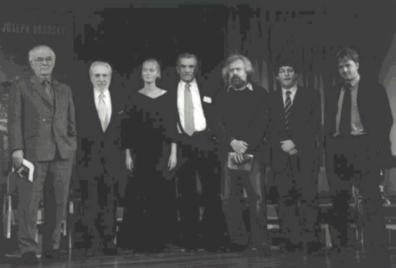
news /contact us / links
American Poets on "Ars-Interpres"
Billy Collins
Eamon Grennan
Frederick Smock
THE LIBRARY OF CONGRESS
101 Independence Avenue, S.E.
Washington, D.C. 20540-4861
18 April 02
I am writing in support of the publishing house Ars-Interpres and its energetic program of translating English-language poets into Russian.
Translation has been called the art of the impossible, and yet it is
the most available bridge to join the language and cultures of different
countries. In an age of political division and upheaval, these binding
efforts are all the more to be applauded. I must try to sound modest here
since I am among the list of poets to be translated, but I do think that
the choices the press has made are excellent. To think that a large Russian
audience will be exposed for the first time to the poetry of Eamon Grennan,
Louise Gluck, Paul Muldoon and others is a truly exciting prospect.
United States Poet Laureate
Vassar College
Department of English
March 16,2002
It’s pleasure for me to write on behalf of Ars-Interpres.
The work they are doing at the press – work done and work planned – constitutes a remarkably innovative project, and one of deep cultural importance. By translating the work of American (and some Irish!) poets into Russian, they are opening a door of understanding between our cultures. Bringing over into Russian the concerns, the variety, and the active language manners of contemporary poets in English, they are establishing connections that have to lead to deeper awareness of what a particular (and particularly diverse) cultural life ia at its cutting edges and in its depths.
My own experience with two of the translators involved in the project – with Vladimir Gandelsman and Irina Mashinski – has convinced me not only of the seriousness of their commitment to the project and to the work they are translating, but has also illustrated for me what scrupulous readers of my work they are. I have nothing but admiration for the meticulous way they have undertaken to bring over my words and lines, my cadences and implications, into their language. I have in fact learned something about my own poems from the various questions and speculations they have offered. The sense, therefore, of being involved in a co-operative venture is strong, and very satisfying.
So I feel any of the poets being translated by the member-translators of this project are in very good hands (and ears!) and I will have no hesitation in recommending to them poets of my own acquaintance, since I believe they will do an excellent job of bringing all of us over into the Russian language, and letting us (to, I’m sure, our gratified surprise) live as poets in this new language. That is a special gift from one poet to another. It is certainly part of my own ambition as a translator: I’ve wanted to carry over Leopardi, Montale, Horace, or the Irish language poet Nuala ni Dhomhnaill into English that will have a life of its own, will not be a betrayal of the original. It is this gift, of energy, creative fidelity, and critical concern that our Russian colleague-poets intend to offer to us poets writing in English, and to their own Russian readers. The sense of my own work being taken in by Russian readers as something made recognizable in their own (wonderful) languge is a true and abiding pleasure for me.
So I very much hope that Ars-Interpres receives whatever funding they
need to carry out this ambitious, generous, and richly conceived work of
theirs. It certainly has my full (and grateful) support.
Dexter M. Ferry Professor of English at Vassar, and
2002 Heimbold Chair of Irish Studies at Villanova
Bellarmine College
Louisville
20 February, 2003
I am writing on behalf of the vitally important work that Ars-Interpres is doing, particularly through their book publishing program and their new annual journal of international literature.
To write or publish poems is to hold out some hope for the world, to contend mightily with the brutal politics of the marketplace, advertising, and the cheapening of the world, and, of course, it is to contend mightily with brutal politics per se. In this dangerous age, Ars-Interpres works very hard at improving international understanding, bringing the world closer together, by introducing contemporary American poets to Russian audiences. The dialogue established, between reader and writer, does no less, I think, than fulfill Dostoevsky’s prophecy: “beauty will save the world.”
Everywhere people talk of money. Nowhere is there enough of it. But
art, in particular Ars-Interpres, deserves our support, because without
it we are all impoverished. There is no price to put on international understanding.
And, as our world grows ever more dangerous, and more and more money is
spend on weapons of mass destruction, it becomes more imperative that we
cultivate, as Galway Kinnell said of poetry, a “tenderness toward existence.”
It is no less than our biological imperative -- Joseph Brodsky wondered
if the making of culture isn’t the goal of our species!
Bellarmine College
Louisville

(left to right) Seamus Heaney, Anthony Hecht, Maria Brodsky, Derek Walcott, Vladimir Gandelsman, Paul Muldoon, Glen Maxwell at the poetry reading “Tribute to Joseph Brodsky” in Guggenheim Museum (New York,December 2001)
Photographer: Yioing Chen-Josephson